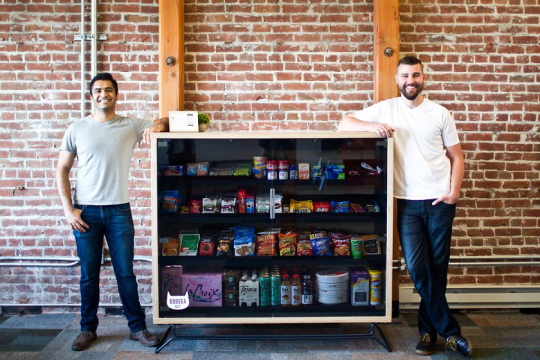
Two ex-Google employees caused some controversy in launching a new concept, Bodega, which appears to take aim at mom-and-pop convenience stores, all while sporting the name of the very type of store it is trying to compete with.
The company builds out five-foot-wide pantry boxes on street corners, filling them with non-perishable items that shoppers might pick up at a convenience store. With a mobile app, shoppers can unlock the box, which will automatically charge customers for what they take.
The startup already has installed 50 kiosks on the West Coast and plans to have 1,000+ nationwide by the end of 2018.
The RTP team discusses whether the kiosks, or any similar service, pose a threat to actual convenience/corner store owners, and whether it was a tactful decision to name the company “Bodega.”
Debbie Hauss, Editor-in-Chief: I think it is a serious threat to mom-and-pops, as well as extremely distasteful and cruel. I know “business is business,” but there has to be a line — and this is crossing it. Instead of attacking these local family businesses that have been serving their small communities for generations, these ex-Googlers should find a better way to use their intelligence and creativity. That said, these businesses need to be aware of the different ways technology and overzealous entrepreneurs can attack their businesses. There’s actually a Bodega Association, ASOBEU, that should jump in to find ways to help individual bodega owners. There are, according to ASOBEU, 14,000 bodegas in New York City alone.
Adam Blair, Executive Editor: Certainly the Bodega ‘Bros’ are guilty of insensitivity with their claim that their kiosks will replace actual neighborhood stores — but really, what else would you expect from a pair of Silicon Valley dudes? As Deb Gabor, a brand strategy consultant, said in supplied commentary, “The ‘killing the mom and pop shop’ message is not only offensive, it’s not really designed for either a customer or end-consumer audience. You can say that to investors; but don’t ever tell a real human being that you’re going to kill a familiar social convention.” I’m not minimizing the offense people have taken to this act of cultural appropriation, but I think a bigger issue is that these kiosks represent the continuing move to marginalize small cash businesses operating in underserved areas. Not everyone has a smartphone, or necessarily wants one. The march to constant connectivity is going quickly enough; I’m not sure it needs rocket fuel.
Marie Griffin, Managing Editor: Paul McDonald and Ashwath Rajan pulled off a great PR coup with stories in national media and a flash of social media posts, but their glorified vending machines are no threat to the neighborhood bodega. A real bodega brings retail to neighborhoods that aren’t being served by traditional grocery stores, and pretty machines that require credit card payments aren’t going to those places. You’ll see these kiosks, which might be renamed, in luxury apartments, college dorms and office buildings. They could also be useful in hospitals, where health care workers with odd shifts might need milk or diapers, and 55+ residential complexes, where people can’t easily get to a store. These data-driven kiosks could definitely fulfill a need in some specific spots and, if McDonald and Rajan execute their business as well as their PR machine, they might have a nice niche business someday.
Glenn Taylor, Senior Editor: From an innovation standpoint, I can see why they’ve taken this direction. We’ve seen how companies like Uber and Lyft have disrupted the taxi industry, with cab companies none too thrilled at the competition and local city governments trying to fight back. With that said, I’ve never really felt the need for this kind of vending service, especially when convenience stores are right around the corner for me (obviously I don’t speak for everyone here). And I feel like the two people in charge of this venture are intentionally looking to get people riled up as a free marketing tactic on their end. With a different name than “Bodega,” something tells me this startup wouldn’t be getting the coverage it’s getting now, especially in an environment where there are so many startups vying for attention. I don’t deny that the platform can continue growing, but with the sheer number of convenience stores within walking distance in urban areas, I just can’t see these kiosks taking away enough market share to keep their owners up at night (unless of course they are working the graveyard shift anyway).
Klaudia Tirico, Features Editor: From a consumer perspective, I personally would have zero interest in getting my pantry goods from a five-foot-wide box. As Marie mentioned, they’re glorified vending machines, and I’d much rather support local bodegas than two ex-Googlers who probably have enough to live off of. I’d like to think other consumers would feel the same way. Aside from the initial “cool factor,” it’s just not realistic to me that this concept would catch on with consumers. And that’s in addition to the point that this idea — especially the name itself — is just plain mean and filled with poor judgement. I do, however, believe that local business owners should keep up with the evolving retail industry and consumer demands, to ensure they are doing what they can to stand out from the competition.






